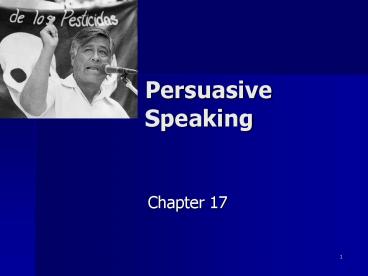Persuasive Speaking - PowerPoint PPT Presentation
1 / 17
Title:
Persuasive Speaking
Description:
Persuasive Speaking Chapter 17 Persuasive Speech Attempts to change or reinforce thoughts, feelings or actions Types of Persuasive Speeches Questions of Fact ... – PowerPoint PPT presentation
Number of Views:135
Avg rating:3.0/5.0
Title: Persuasive Speaking
1
PersuasiveSpeaking
- Chapter 17
2
Persuasive Speech
- Attempts to change or reinforce thoughts,
feelings or actions
3
Types of Persuasive Speeches
- Questions of Fact
- Questions of Value
- Questions of Policy
4
Questions of Fact
- Whether something is true or not
5
Question of Value
- Addresses the merit or morality of an object,
action, or belief
6
Question of Policy
- Addresses the best course of action or the best
solution to a problem
7
Goals of Speeches onQuestions of Policy
- Immediate action or passive agreement
See Dana Barkers Persuasive Speech in the text
on p. 375
8
Call to Action
- A request that an audience engage in some clearly
stated behavior
Go to the Interactive Student and Professional
Speeches Website to see Brent Erbs persuasive
speech calling for immediate action.
9
Problem-Solution Organization
- Focus on persuading audience that a specific
problem exists can be solved or minimized by a
specific solution
10
Using Problem-Solution Organization
- Identify clearly defined problem
- Identify relevant problem
- Offer solution that remedies problem
- Offer solution appropriate for audience
11
Problem-Cause-Solution Organization
- Focus on identifying a specific problem, causes
of problem solution for problem
12
Comparative Advantages Organization
- Illustrate the advantages of one solution over
others
13
Monroes Motivated Sequence
- Gaining attention
- Demonstrating need
- Satisfying need
- Visualizing beneficial results
- Calling for action
14
Tips for Giving EffectivePersuasive Speeches
- Be realistic about changing audiences views
- Use evidence fairly strategically
- Use language that respectfully motivates audience
to change
15
Use Evidence Fairly Strategically
- Two-sided messages
- Counterarguments
- Fear appeals
16
Ethical Persuasion
- Dont threaten freedom to choose
- Recognize issue complexity
- Recognize impact of solutions
- Understand your own positions
17
Ethical Persuasion
- Tell the truth
- Avoid distorting or manipulating evidence
- Present information accurately completely































